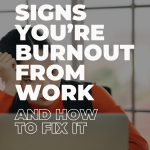Signs You’re Burnout From Work And How To Fix It
Experiencing that feeling of being emotionally and physically wiped out by work is something a lot of people go through. Being burnout from work, even though it’s not clinically labeled, is a pretty big deal that can mess with your overall well-being. It’s more than just feeling tired—it’s this ongoing sense that you’re losing your personal accomplishments and identity. Whether it’s from the job itself, your personal traits, or other stuff going on, it definitely takes a toll on both your physical and mental health.

Spotting the signs of job burnout is super important. It’s not only about feeling stressed, but also feeling detached, less satisfied, and noticing your work performance taking a nosedive. The effects are massive, affecting your relationships, how content you feel with your job, and basically your overall happiness. Finding ways to handle and ease this feeling is a big deal. For instance, you can take a look at these stress-reducing techniques and self-compassion practices to prioritize your well-being.
What is employee burnout?

Work burnout is like your internal stress alarm blaring after being stuck on high alert for too long. It’s not just feeling tired—it’s a complex mix of emotional, physical, and even social stress piled up like a never-ending stack of overdue tasks. As this stress builds up, it’s like a battery draining: emotionally drained, physically wiped, and a mental ‘out of order’ sign blinking overhead.
You start looking at work with a jaded eye, feeling disconnected and disengaged, almost as if your once-bright work motivation got dimmed by the weight of it all. It’s not just one thing that triggers this alarm; it’s the clash of deadlines, team tensions, and this never-ending pile of tasks that forms a pressure cooker right there in your workplace.
What Are The Signs That You’re Burnou From Work?
1. You’re constantly tired

The never-ending stress and pressure from work burnout is like a continuous fatigue that just won’t quit. All that ongoing pressure from crazy work demands and emotional strain takes a toll on your physical and emotional energy stash. It messes up your body’s stress coping mechanisms, draining your energy and leaving you feeling tired 24/7. And here’s the kicker: no amount of rest or time off seems to hit the refresh button. It’s a cycle of non-stop stress without proper recovery, and that’s why you end up feeling constantly worn out.
2. Your productivity has decreased

Work burnout often leads to reduced productivity due to concentration difficulties and an overall decline in job performance—the struggle to focus on tasks results in a notable drop in productivity levels despite sustained efforts. The mental and physical exhaustion from burnout inhibits effective task performance, creating a cycle where grappling with burnout further impairs work output, impacting both the individual and the workplace.
23 Wisdom Quotes To Illuminate Your Life’s Path
3. You have a negative attitude toward work

Workplace burnout can shift your perspective towards work, colleagues, and tasks, often fostering a negative or cynical view. The unrelenting strain and pressure can chip away at your enthusiasm, leaving you feeling pessimistic about work matters.
This might show up as increased irritability, impatience with coworkers, or a general disengagement from tasks. Burnout from work can make it tough to keep a positive attitude, impacting both your well-being and how you relate to others at work.
4. You isolate yourself from workmates

Workplace burnout can make you feel emotionally distant from your job, colleagues, and the whole setup. This disconnection often nudges you towards pulling away or stepping back from social interactions at work. The ongoing stress and exhaustion create this feeling of losing touch with your work environment.
As a result, you may feel disconnected from both the tasks and the people around you. As this detachment grows, you might notice yourself gradually pulling away from social interactions, which can contribute to a sense of isolation within the workplace.
5. You’re unsatisfied with your accomplishments

Encountering work burnout may cause a sense that your efforts are falling short. Despite investing significant work, the sustained strain and exhaustion diminish the satisfaction derived from your achievements. As a result, your motivation wanes, and your enthusiasm for your tasks diminishes.
The exhaustive toll from burnout obscures your perception of your accomplishments, generating a disheartening feeling that your efforts go unrecognized. This significantly impacts your drive and the enjoyment you find in your work.
6. You have sleep issues

Burnout from work seeps into your sleep, creating significant challenges in falling asleep and maintaining restful sleep. The stress and worry from work pressures act as barriers, hindering your ability to relax and achieve peaceful nights. This strain and constant thinking make it hard to start and keep a deep, refreshing sleep, leading to disrupted sleep patterns.
Work-related stress staying at the forefront of your thoughts hampers achieving rejuvenating sleep, perpetuating a cycle of fatigue that worsens the impact of burnout on your overall well-being.
7. You’re easily irritated

Experiencing work burnout can often lead to increased irritability, making you more sensitive to stressors and easily agitated. This heightened sensitivity puts you on edge, causing situations that wouldn’t usually bother you to become triggers. The ongoing strain from work-related stress shortens your fuse.
This leads to stronger or more negative reactions in circumstances that previously didn’t affect you as much. This intensified irritability is a clear sign of how work burnout can significantly impact how you emotionally respond and interact in the workplace.
8. You often forget about self-care

When you’re in the midst of work burnout, it feels like your personal needs take a back seat. The constant pressure from job demands or persistent fatigue becomes the priority, overshadowing self-care. You find yourself delaying essential routines such as healthy eating, exercising, and socializing.
This cycle of work burnout becomes consuming, making it challenging to focus on self-care, resulting in a decline in attention to your physical health, mental wellness, and social life.
What Causes Burnout From Work?
Lack of control

A lack of control over job decisions, like your schedule and workload, significantly contributes to job burnout pressure. Insufficient tools or resources can create powerlessness and frustration, elevating stress levels. This loss of control and essential resources diminishes motivation and intensifies stress, paving the way for work burnout.
Toxic workplace dynamic

In a toxic work setting with dysfunctional dynamics, it leads straight to work burnout. Facing an office bully, feeling undermined by colleagues, or enduring excessive boss oversight significantly increases job stress. This tense, uncomfortable atmosphere causes emotional exhaustion and reduced job satisfaction, disrupting your sense of safety, support, and professional respect, impacting your overall well-being and work performance.
Too much pressure

Facing extremes in your work—be it a monotonous routine or a chaotic environment—can lead to burnout as you constantly require high energy to stay focused. A monotonous job exhausts you mentally with repetitive tasks, while a chaotic workplace demands extensive mental and emotional energy in high-pressure situations.
Lack of social support

The lack of a supportive network can intensify feelings of being overwhelmed and unsupported, amplifying the pressure experienced in both work and personal spheres. This compounded stress from isolation can significantly contribute to the development of work burnout.
No work-life balance

When work takes up most of your time and energy, leaving little for your loved ones, burnout can sneak up fast. If you struggle to create a boundary between work and personal life, it drains your emotional and mental strength, making burnout a real risk. Balancing work and personal time is crucial to avoid feeling emotionally drained and burning out.
Boost Your Confidence: 20+ Body Positivity Affirmations To Practice
How To Manage Being Burnout From Work
Set boundaries and practice self-care

To fight work burnout, establish firm boundaries between your work and personal life. Determine set work hours and prevent work from intruding on your personal time to establish a distinction between work and relaxation. Prioritize self-care by engaging in activities like exercise, hobbies, mindfulness, and spending time with those you cherish. Remember to take breaks and plan vacations to rejuvenate and sustain a healthy work-life equilibrium.
Communicate your concerns

When experiencing work burnout, don’t hesitate to open up and discuss your workload stress with your manager or colleagues. Seeking support and sharing challenges can lead to solutions like task delegation or workload adjustments. Consider consulting a counselor for better management of burnout; their expertise can offer valuable strategies and support during this challenging time.
Manage your stress levels

In managing burnout from work, it’s crucial to adopt self-management techniques. Try integrating stress-reduction methods like mindfulness, meditation, deep breathing exercises, or yoga into your daily routine. These practices offer relief from stress and create a peaceful space amidst your demanding work environment. They serve as vital tools to help lessen the impact of work pressures on your overall well-being.
Take mini-breaks while working

To alleviate work burnout, it’s crucial for you to take regular breaks throughout your workday. Stepping away from your workspace, whether for a walk or a different activity, offers a refreshing mental break. Furthermore, intentionally disconnecting after work hours—such as by silencing work-related notifications—is equally important. Establishing a clear boundary between your work and personal life fosters a healthier balance and helps diminish the strain brought on by the constant work demands.
Dealing With Burnout From Work
Addressing work burnout necessitates a personalized method using diverse strategies since what’s effective for one person may not be for another, often requiring experimentation. If burnout persists despite your attempts, seeking professional guidance or pondering modifications in your work environment or tasks becomes crucial. Acknowledging the individual impact of burnout and remaining receptive to various solutions is pivotal in discovering the most effective methods to confront and overcome this daunting challenge. Keep in mind that seeking assistance and considering essential changes are fundamental steps toward restoring a more balanced work-life equilibrium.
If you found this post helpful, make sure to look into these blogs that may also resonate with your journey:









